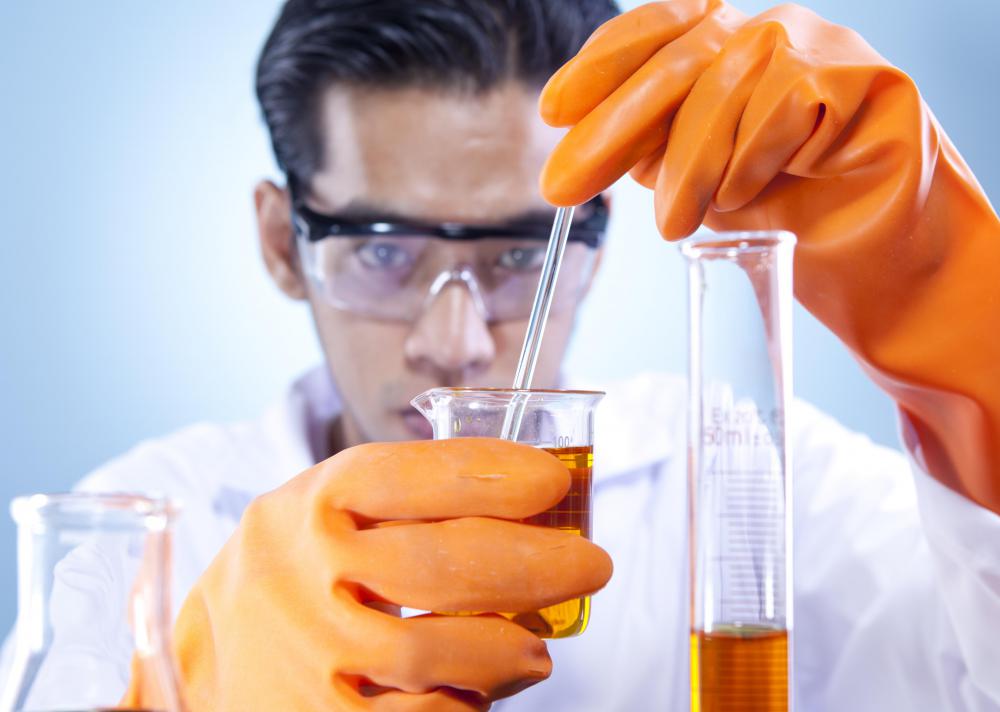At PracticalAdultInsights, we're committed to delivering accurate, trustworthy information. Our expert-authored content is rigorously fact-checked and sourced from credible authorities. Discover how we uphold the highest standards in providing you with reliable knowledge.
How Do I Become a Marine Chemist?
How you can become a marine chemist depends entirely on which sort of marine chemist career you are looking for: chemists who work aboard boats to ensure fire safety generally come from chemical engineering backgrounds, while chemists who study ocean composition are usually trained in biology, oceanography, and other hard sciences. Most of the time, you can become a marine chemist in the fire preparedness and occupational safety sector by earning a bachelor's degree in basic chemistry or engineering, then taking on some practical experience in large vessel mechanics. This training will not help much if you want to become a marine chemist who studies ocean water and the health of the seas. A degree program in ocean chemistry and experience working in ocean labs and sea research facilities will be your best bet in that case.
In either case, the key elements to your success in the field are education and experience. With very few exceptions, you will need a university degree. You can supplement your education with experience, such as an internship or a field study course, or you can find wholly extracurricular opportunities. Particularly for engineering chemists, proving aptitude upfront is one of the best ways to successfully break into the field. An interest in research, on the other hand, is essential in order to become a marine chemist in the oceanographic side of things.

To become a marine chemist who helps boats and other large sea vessels pass their safety inspections, you will need to start out studying chemistry, with an emphasis on inorganic processes, reactions, and the physics behind chemical engineering. Many technical universities have specific chemical engineering courses, but smaller schools with more limited departments will put more of the specialization onus on you. Look into different training opportunities in your area — either over school breaks or during the summer — that will show you how your education can make sense in a vessel safety setting. This includes internships and summer courses related to ships and ship safety.
In most places, you will be able to find entry-level work as soon as you have a basic degree. Intensive marine chemist training is almost always required, but is usually included as a part of your job orientation. Depending on your employer, training can last anywhere from six months to a year and usually involves intensive apprentice work on board ships, working directly under more experienced supervisors. In most jurisdictions, marine chemist requirements include passage of a marine chemist’s licensing exam, as well as regular re-certification.
Marine chemists in this capacity often have a lot of opportunities for job growth. Vessels around the world need to be inspected to ensure that they are both seaworthy and prepared for calamity, particularly fire. Oil shipping vessels and military craft are among the most tightly regulated, and marine chemist jobs are always in demand in these sectors. With the right education, training, and success on the job, you will likely have little trouble securing meaningful employment — and you may even find that becoming a marine chemist was easier than you thought.
Getting started is often harder if you want to become a marine chemist who studies the ocean. The vast majority of oceanographic marine chemists have postgraduate degrees, usually at the doctorate level. This sort of intense academic study usually requires the marine chemist to focus very narrowly on one aspect of the field. Some people know exactly what they want to study the moment they graduate, but this is not common. If you are not sure which precise aspect of the field you want to devote yourself to, look for work experiences in an array of fields to get an idea of what options are available.
Many marine chemistry teams hire young graduates in entry-level positions, but there is usually little opportunity for advancement in these jobs without more schooling. Nevertheless, they are a great way to get some experience behind you and are a common starting place for many. Tangible experience will round out your applications to graduate school and can also help you define your future goals and identify the marine chemist careers that interest you the most.
AS FEATURED ON:
AS FEATURED ON:











Discuss this Article
Post your comments